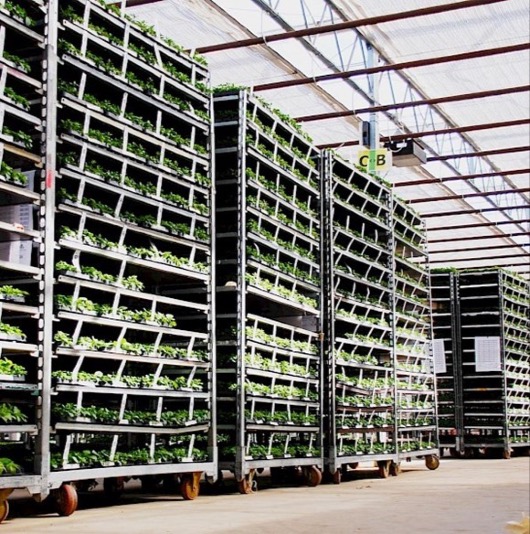
The HTA has launched Let Britain Grow, a campaign calling for the Government to negotiate a plant health agreement between the UK and the EU that will enable the multi-billion pound sector to boost the nation’s economic growth and fuel international trade post-Brexit.
Highlighting additional and excessive regulations forced on the sector by Defra, Let Britain Grow has been set up by the Horticultural Trades Association (HTA) and supported by VBN, the Association of Dutch Flower Auctions. It signposts the opportunities that European trade offers and call for an agreement that will remove current barriers and help mitigate the rising costs that are hampering trade.
Last year, plants fell under the same category as weapons of mass destruction, torture equipment, explosives and arms, when they were included in the list of controlled goods by the UK Government. Although the classification was removed, the disproportionate requirements for pre-notification and import inspections remain.
Trade is currently being obstructed by the increase in time and costs for businesses in importing plants and trees into the UK. From the 1 June 2021 a substantial fee was added to import inspections, while in January controls were imposed on plant border movement, adding layers of complex and lengthy pre-notifications, certificates and inspections. Meanwhile, checks and fees will not be required for most other sectors until 2022, such as the importation of products of animal origin, like dairy and sausages.
The British horticultural industry is worth over 2£24 billion in GDP to this country and supports over 568,000 jobs. The UK brings in £400m-worth of plants and plant material, such as seedlings, cuttings and young starter plants every year. It exports around £80m-worth of plants. EU countries are the UK’s single biggest trading partners.
Meanwhile, small businesses that operate on tight overheads are facing disproportionate additional costs. Commercial grower members are reporting an extra cost of over £3,500 on average, per business, just on inspection fees and additional working hours alone.
“This is the biggest single non-tariff barrier to trade in the history of our industry,” says James Barnes, Chairman of the HTA.
“We all support having a robust biosecurity regime, but the UK Government needs to get a better balance on the regulations and restrictions, which are limiting responsible trade. The spiralling staff hours to administer the paper mountain, inspection fees, phytosanitary certificates and cost increases amounts to £25m-£30m.
“We are speaking with the Government, but they are not reacting. We need to trade more freely if we are to open up our industry to the economic powerhouse it can be and work on a plant health agreement that instils recognition and trust and remove the green tape.
“Let Britain Grow is a chance for the government to get behind an industry that has huge ambitions for growth. We have a real opportunity of developing a post-Brexit opportunity for increased trade in our sector and for the UK internationally.”
Eveline Herben of VBN, says the impact is causing some Dutch companies to think twice before doing business with UK horticulture businesses:
“Since January 2021 trade to the UK has changed considerably with the new UK regulations adding in requirements for extra paperwork and physical inspections of all plants alongside time-consuming pre-notification and pre-export processes. This also leads to considerable extra costs.
“For some products, although artificially propagated and therefore previously exempt from extra requirements, you must also acquire an import permit - another lengthy process which adds up to exporters choosing not to export these products (like Cacti) to the UK anymore.”
While many plants are grown in the UK it is impossible to produce all species here and Britain still has to import substantial amounts from abroad to meet consumer demand. From the retailers surveyed, 72% import plants and plant material from the EU, while nearly all growers (96%) need to import young plants.
According to a new HTA survey, the increased plant health restrictions by Defra have had a negative impact on 78% of members asked (for small businesses – under £1m turnover - it rises to 88%). Currently the UK faces barriers exporting to markets in the EU due to the ban on certain species, growing media and soil attached to plants and despite one temporary ease on trade into Northern Ireland, difficulties exist.
The current restrictions are hitting the pockets of UK gardeners and reducing the choice of products available to them - member retailers estimate an 8% reduction in product ranges with an 8% price increase on hugely popular products like house plants.